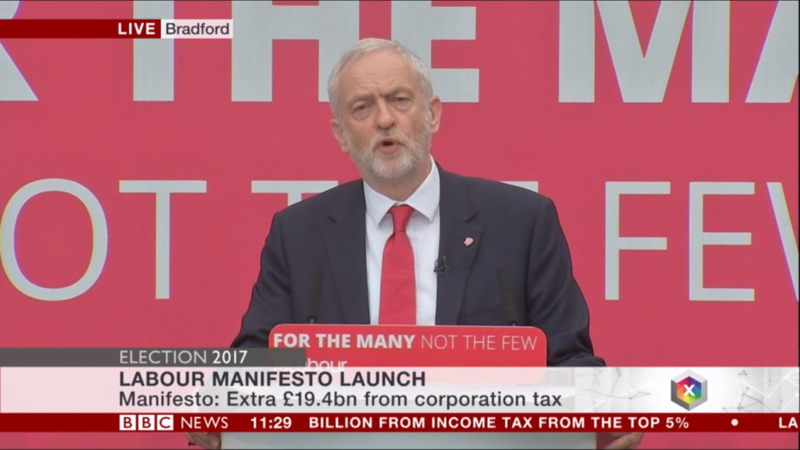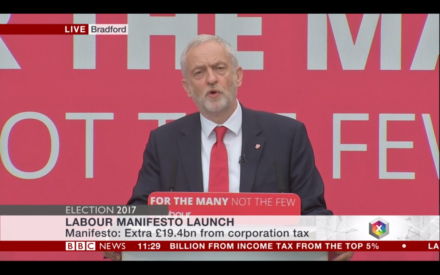

Yes, the print media is overwhelmingly against Jeremy Corbyn – but the sums still have to add up.
The splashes on the Tory-leaning newspapers this morning were damning of Labour’s plans as unveiled at the manifesto launch yesterday. That, however, is hardly a surprise. This may be an election with two atypical candidates for prime minister but the steep media onslaught against a left-wing opposition is very traditional.
Labour moved to pre-empt this before yesterday’s event in Bradford. Just as with Ed Miliband two years ago, the party knows that its economic pitch must stand up to intense media scrutiny.
In 2015, Miliband and Ed Balls signed up for a “budget responsibility lock” and put deficit reduction on the first page of the manifesto. They went on to propose a series of economic reforms that were sober and sensible, were rubbished by the Tories for months – and then adopted by David Cameron and George Osborne after polling day.
This time around, Labour faces a heightened version of the same challenge on the economy. It is further behind on voter trust on economic competence and it has moved away from the centre ground. It’s up to you whether you describe the manifesto as “left-wing” – which we would surely see as a good thing – or “ultra-left”, “hard-left” or “1970s-style”. There is much in the document that Ed Miliband would agree with – and there are a few things that David Miliband could back. Either way, the newspapers have been preparing their jibes for Corbyn’s policy offer for the last two years.
What’s clear is Labour has published a far more radical plan than at the last election. And, knowing the economic attacks were just around the corner, it yesterday issued a companion document, called Funding Britain’s Future, in an attempt to allay the doubts of voters and journalists.
This effort wasn’t helped by the stumble of John McDonnell on the Today programme when he appeared to be unsure of the size of the deficit. This seemed to be quickly forgotten, however, and much of the reaction to Labour’s day in the spotlight was driven around the bold plan for the water industry, Corbyn’s comments on scrapping the Tory benefits freeze, which prompted a “clarification” later on; and the sheer breadth of Labour’s proposals for state intervention.
The reaction shows that most elections come down to a battle on tax and spending, economic trust and questions of leadership. And this one is little different.
No, neither Theresa May nor Corbyn are typical candidates to run the country. The incumbent is strong in the country and weak in her own party. And she has made it to the top of the country despite displaying an apparent aversion for engagement for dealing with the media – witness her bizarre “no questions” visits on the campaign trail. The challenger, we all know, is the 200-1 outsider for the leadership who now commands a party competing for government.
But despite all this curious factors the election returns to the usual themes. When Richard Burgon, the shadow cabinet minister, told Newsnight it felt like Labour was being “put on trial” for its proposed higher public spending then he was not wrong. What I would have done a little differently would have been to go through the trial, aim to emerge successfully, and then pick up with the television producers afterwards if the treatment felt unreasonable.
Most elections involve putting the opposition on trial. The print media, of course, feel like a particularly ferocious prosecutor – or, in extremis, a “feral beast”, as Tony Blair said towards the end of his time in office – but, there are few ways around them. Broadcasters are obliged to be balanced in the airtime they hand to different parties but it is still duty to be ferocious towards the MPs who aim to run our country.
Labour will, we always suspect, be treated harshly by the media, especially those in print, but the sums still have to add up.




More from LabourList
‘As metro mayors gain power, Labour must tighten political accountability’
Letters to the Editor – week ending 22 February 2026
‘The coastal towns where young people have been left behind by Whitehall’